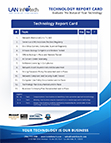Are You Being Safe with Passwords While on Vacation?
With a recent report showing that 80% of breaches are caused by compromised or weak credentials, password protection is more important than ever before.
Never Reuse Passwords
Are you using the same password for your corporate Microsoft account as you use for your personal email — or worse, social media accounts? This type of password sharing can be extremely dangerous in today’s society, as it only takes a single infiltration to unlock your digital world. Think about this: if a cybercriminal managed to discover the password for your Facebook account, they wouldn’t necessarily gain access to your financial institutions unless you have a shared password. Having separate passwords for each account helps restrict the ability of hackers to gain pervasive access to your digital universe. Granted, it can be tough to remember a large number of passwords, which is one of the key reasons that many organizations now encourage staff members to use proactive password management software such as LastPass.
Keep Hardware and Software Up-to-Date
Are you using smart televisions or other connected devices? It’s vital that you only connect your personal information to devices that have an updated security profile. You need wide spectrum protection for your business, starting with maintaining security patches on all of your software and continuing through the connected devices that are a part of your WiFi network. Smart TVs are notorious for being a problem because they may not receive the same level of hardware upgrades and software patches that you would have for a computer or server. Since these devices are connected in through your business systems, maintaining a proactive patch process is every bit as important as maintaining compliance with your business servers.
Use a VPN for WiFi Whenever Possible
It’s not always possible to avoid public WiFi, but you can always take precautions to protect your identity and the sanctity of your business systems. When you do have to use public WiFi, be sure to log out immediately when you complete your transaction. This can reduce the possibility that your information will be compromised and also keep users who access the smart TVs and other devices after you from taking advantage of your purchasing power. With 33% of attacks involving social media, it’s particularly important that you not remain logged into this type of account on a shared device.
Returning from your vacation to find that your personal or business accounts have been compromised is a scary situation but you don’t have to face it alone. The professionals at LAN Infotech work closely with organizations of all sizes to ensure that you have the proactive solutions in place that help protect your accounts and quickly notify you in the event of a breach. This active monitoring can reduce the overall impact of a data breach or malware to your organization — providing exceptional peace of mind to your users. Contact us today at 954-686-8276 or fill out our brief online form to schedule your free initial consultation.

LAN Infotech is a Microsoft Cloud Services Provider, IT Managed Support company and a leader in helping law firms, nonprofits and medical organizations deploy cloud solutions, manage computer networks, keep data protected and top technology management company. Businesses like yours need technology support to run highly-effective organizations.


